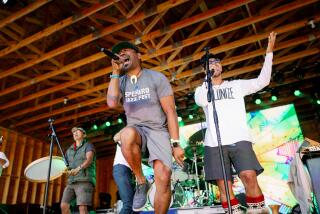Arctic Attorney Feels Call of the Far Frozen North : Justice: The northernmost lawyer in Canada handles cases for the Inuit, who are mostly cut out of the judicial process.
- Share via
POND INLET, Canada — Desmond Brice-Bennett is sometimes called “the highest lawyer in the land”--not for his rank in the judicial hierarchy, but because Pond Inlet is about as far north as Canada gets.
He also may be the only lawyer who moved from the tropics to a part of the world where, on an average winter day, the temperature can reach minus 40 degrees.
Brice-Bennett’s road to this hamlet of 900 people at 73 degrees north latitude began in Nigeria, where he was born 45 years ago.
It led to Tanzania, where he was raised, then to Kenya, a university in England, and then to Canada, where he worked for Arctic and aboriginal groups and eventually studied law.
“Initially, I just found the whole idea of the North romantic without knowing a thing about it,” he said over a meal of stuffed arctic char, the finest of the local fish.
His long association with the Inuit, as Canada’s Eskimos prefer to be called, has deepened that feeling.
“I guess I’ve just liked many of the people I’ve worked with,” Brice-Bennett said.
The Inuit are an overwhelming majority of the 54,000 people in the vast, frozen Canadian northland. They still struggle with a modern world that brought its many baffling concepts to their simple hunter society only about 30 years ago.
One of those concepts is the white man’s system of justice.
In the Arctic, all judges are white males. So are the prosecutors and the defense lawyers. Only in jury trials do the natives exert any influence.
“We’ve completely taken away from the Inuit the resolution of criminal problems, with the exception of jury trials,” Brice-Bennett said. “But there are few jury trials.”
He works for a group called Maliiganik Tukisiiniakvik. An approximate translation of the name from Inuktitut, the Inuit language, is “the place where you go to learn about the rules you have to follow.”
It is a private organization but fulfills the role of a public defender and bills Canadian Legal Aid for its services. Since virtually all the Inuit who get into trouble are indigent, Brice-Bennett handles the defense in most criminal cases in this part of the eastern Arctic.
The federal court based in Yellowknife, the territorial capital, and the territorial court in Iqaluit, the regional center, each has a circuit. Judges and lawyers travel to the small Arctic communities on a regular basis.
“A lot of it is pretty trivial property crimes, (and) spousal domestic violence and sexual abuse cases,” Brice-Bennett said. “Usually it involves teen-agers or people in their early 20s--unemployed, looking for kicks and breaking and entering. Some get into trouble just because they’re bored.
“The court is a very blunt instrument. Once a person is convicted and a sentence is imposed, we seem to completely lose our imagination. There is either jail or probation.”
Punishment is another concept alien to the Inuit.
As the lawyer put it, “The idea of punishment is not an idea the Inuit possess.
“Inuit want to rectify matters, to solve problems. So much of this stuff shouldn’t be in the courts at all. There should be some kind of community system to deal with family matters and first-timers.”
Brice-Bennett believes the Canadian justice system is simply not prepared to deal with the kinds of social problems that face native people today.
Alcohol is at the root of much violence and disorder in the north, and drug use is increasing. Marijuana and hashish are the most common drugs in a little place like Pond Inlet, but cocaine is getting into the larger towns.
Jury trials involve sexual assaults, the occasional homicide and some drug cases. Only about 20 were held in all of 1991.
Traveling the circuit from settlement to settlement by small plane is a hard life, but it can be a good one for someone who likes hunting, fishing and camping.
More to Read
Sign up for Essential California
The most important California stories and recommendations in your inbox every morning.
You may occasionally receive promotional content from the Los Angeles Times.










